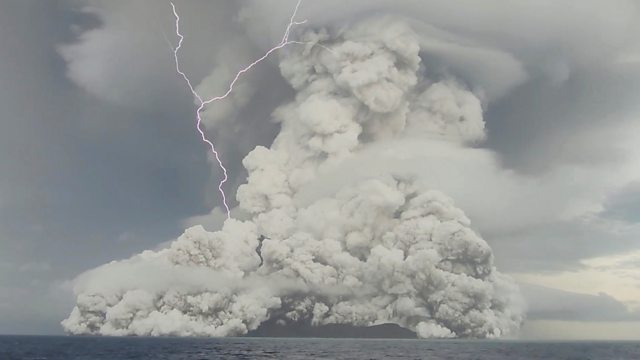Tsunami detective in Tonga
Tsunami detective work in Tonga. The ancient mammals who evolved brawn before brains. Robot skin which feels. The world’s coastal cities sinking faster than sea-level rise.
Just over two months ago, the undersea volcano of Hunga Tonga erupted catastrophically, generating huge tsunamis and covering the islands of Tonga in ash. University of Auckland geologist Shane Cronin is now in Tonga, trying to piece together the sequence of violent events.
Edinburgh University palaeontologist Ornella Bertrand tells us about her studies of the ancient mammals that inherited the Earth after the dinosaurs were wiped out. To her surprise, in the first 10 million years after the giant meteorite struck, natural selection favoured larger-bodied mammals, not smarter ones.
At the University of Bristol, a team of engineers is developing skin for robots, designed to give future bots a fine sense of touch. Roland shakes hands with a prototype.
A global satellite survey of the world’s largest coastal cities finds that most of them contain areas that are subsiding faster than the rate that the sea level is rising. Some cities are sinking more than ten times faster, putting many millions of people at an ever-increasing risk of flooding. Oceanographer Steven D’Hondt at the University of Rhode Island explains why this is happening.
The odds of becoming a fossil are vanishingly small. And yet there seem to be an awful lot of them out there. In some parts of the world you can barely look at a rock without finding a fossil, and museum archives worldwide are stuffed with everything from ammonites to Archaeopteryx. But how many does that leave to be discovered by future fossil hunters? What’s the total number of fossils left to find?
That’s what listener Anders Hegvik from Norway wants to know and what CrowdScience is off to investigate. Despite not having the technology or time to scan the entire planet, presenter Marnie Chesterton prepares to find a decent answer. During her quest, she meets the scientists who dig up fossils all over the world; does some very large sums; and asks whether we'll ever run out of the very best and most exciting fossil finds.
(Image: An eruption occurs at the underwater volcano Hunga Tonga-Hunga Ha"apai off Tonga, January 14, 2022.
Credit: Tonga Geological Services/via Reuters)
Last on
More episodes
Broadcasts
- Sat 9 Apr 2022 23:06GMTÂ鶹ԼÅÄ World Service South Asia & East Asia only
- Sun 10 Apr 2022 00:06GMTÂ鶹ԼÅÄ World Service except East Asia & South Asia
Podcast
-
![]()
Unexpected Elements
The news you know, the science you don't


